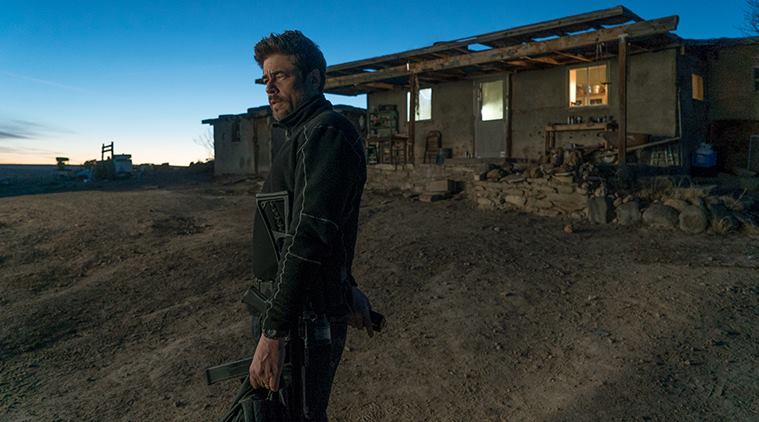 Sicario Day of the Soldado movie review: Day of the Soldado ends up being a Mexican film. And about the mess that a myopic, hasty America tends to leave in its wake.
Sicario Day of the Soldado movie review: Day of the Soldado ends up being a Mexican film. And about the mess that a myopic, hasty America tends to leave in its wake.
Sicario Day of the Soldado movie cast: Josh Brolin, Benicio Del Toro, Isabela Moner, Jeffrey Donovan, Catherine Keener
Sicario Day of the Soldado movie director: Stefano Sollima
Sicario Day of the Soldado movie rating: 3 stars
The first Sicario (2015) came before the Age of the Trump. The timing of Day of the Soldado is rather unfortunate, given the global attention focused on that US-Mexico border, where the American President’s seemingly farcical proposition to build a wall has in almost no time at all acquired tragic proportions, with children of people trying to cross over illegally separated from their parents.
Day of the Soldado features that border, children caught in it in different ways, as well as it brings into the mix suicide bombers who spread prayer rugs, hold up their palms in prayer and then detonate themselves — gruesomely but pointlessly. The film also makes a detour to Africa, to countries that fall within the amorphous global Islamist terror map, and has the US Defence Secretary talking about “sending the full weight of the US military” after its enemies. At another point, Iraq is referenced as a good example of how America can go about taking care of its overseas problems — “just get everyone fighting against one another”. In all seriousness.
However, worry not. Director Sollima may have a rather curious view of geopolitics, and may even seem to justify the angle from which Donald Trump seems to see it, through the prism of the Mexico border, but halfway through, in a subversion that only dawns you gradually, Day of the Soldado ends up being a Mexican film. And about the mess that a myopic, hasty America tends to leave in its wake.
Sicario makes a return three years after the first one, without Emily Blunt, who was the moral centre of that film’s crooked, corrupt, bleak world, with no lines including the border that wouldn’t be crossed. That huge hole left by Blunt is adequately filled up in Day of the Soldado by both Del Toro, reprising his role of hitman Alejandro from Sicario — again haunting, again haunted — and Moner as the girl, Isabel, he would kidnap and then become a father figure to. The latter, of course, may not seem surprising, but as Sollima captures the slow warmth between them, they inhabit a world just a little bit removed from the one they live in. It’s a bond born of the blood and violence they have grown with, and while the others may be blind to it, the two spot this connection from the start.
The film begins with a terror hit in Kansas traced to illegal migration from Mexico. A panicky US government turns to its trusted shadowy operator, Matt (Brolin), who picks up from where he left off in Sicario. With a difference. That time he was trying to contain drug cartels down to one, to make them manageable and tolerable for America. This time, the idea is to set them back at each other’s throats so that the US could take them on, as they have become more dangerous by smuggling humans across the border. It’s Matt’s idea that one way to start that drug cartel war is to kidnap the daughter of the biggest cartel of them all, which brings 16-year-old Isabel into the picture. He turns to trusted lieutenant Alejandro, of Mexican descent and with an axe to grind against the cartels.
Things go wrong when Isabel and Alejandro get trapped inside Mexico, and the US government, as it had warned, washes its hands of the entire operation.
It’s here that Day of the Soldado really comes alive, in the blood, sweat and tears of the Mexicans seeking “paradiso”, one way or another, across an increasingly dangerous border. Keener may be wasted here as the post-less American official with the thankless job of handling Matt and being the butt of his cynical asides, in shapeless trouser suits, but she gets the best line of the film. When Matt fumes, “Nothing ever changes”, she harrumphs, “Change is the goal? Really?”
Makes you wonder about that wall.

